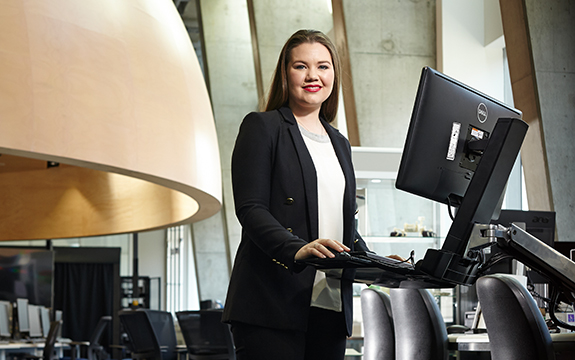Graduate designs wearable device to monitor core body temperature

In Summary
- This article originally featured in Swinburne’s Venture magazine
“I want to use what I’ve learnt to develop products that contribute positively to society. I hope to improve the medical industry through product innovation.”
Swinburne graduate Jacqueline Savage wants to make the world a better place.
“I lost a close friend at the beginning of my studies and knew that I wanted to make a difference,” Ms Savage says.
It was the reason she aspired to a career in healthcare and, inspired by Swinburne’s Professor Sally McArthur, Ms Savage decided to follow the path of biomedical engineering.
After graduating from Bachelor of Engineering (Product Design) (Honours) in 2013, Ms Savage founded MedCorp Technologies by commercialising her final-year Product Design Engineering project.
Fuelled by her desire to make change, she spent a few years working in biomedical technologies and had designed an ambitious, wearable patient device that would integrate remote drug delivery and monitoring.
But Ms Savage was at a crossroads. Her idea was too complex and her efforts to secure ties with an investor had stalled.
“I emailed (Swinburne’s Vice- Chancellor and President) Professor Linda Kristjanson out of the blue explaining to her what I wanted to do, and that I wanted Swinburne to be involved,” Ms Savage says.
The project quickly gathered momentum with the help of Professor Kristjanson and a team of Swinburne mentors. They helped Ms Savage secure more funding, provided guidance and gave her team access to the Factory of the Future, a part of the Innovation Precinct.
Ms Savage altered her design and focused on the patient-monitoring aspect, designing a wearable patch that monitors a patient’s core body temperature.
“Going back to Swinburne and having Professor Kristjanson champion me and facilitate those connections was exactly what I needed,” she says.
“I want to use what I’ve learnt to develop products that contribute positively to society. I hope to improve the medical industry through product innovation.”
Ms Savage also won this year’s Victorian Entrepreneur Award in the Victorian Telstra Business Women’s Awards. She is in the running to win the national award.
How MedPro measures up
After multiple tweaks and assessment of industry needs, MedPro has become a wearable, patient-monitoring device that measures core body temperature by being placed on the skin.
The device could appeal to hospitals because a change in core body temperature can be a signal for an elevated condition in a patient.
MedPro can provide almost constant updates on a patient’s core body temperature, displaying the results on a wireless monitor. Readings are accurate and provided in near real-time. An automatic alert is sent if the temperature fluctuates wildly.
MedPro can reduce the need for manual measuring with thermometers, which occurs regularly during a hospital stay. The device could also free up hospital beds, by allowing earlier discharge if patients’ core body temperatures are healthy.
The technology is here
Ms Savage’s team, which includes fellow Swinburne graduate James Bell, is working hard in the Factory of the Future to complete the MedPro monitoring device. The space has been designed to provide industry and organisations such as theirs with state of- the-art facilities to explore concepts for manufacturing next-generation products.
“The facilities are hands-down fantastic,” Ms Savage says. “Having access to the range of equipment available is key to what MedCorp does. It’s very much industry-relevant equipment that I think students need to be exposed to.”
“In terms of the digital revolution that we’re dealing with, more and more students need to be getting hands-on experience and more involved with electronics, software programming and flexible printed circuit boards,” she says.
This digital revolution, otherwise known as Industry 4.0, occurs where automation and data exchange become the norm in manufacturing technologies, including the use of cyberphysical systems and cloud computing.
“To create a space where students can come in as a team, to have access to prototyping and product development at this level is unprecedented. You can’t get that anywhere else. You couldn’t get that experience if you went and worked for a big multinational.”
Ms Savage hopes the next step for Swinburne will be to give current students more access to the space and technologies, providing them with the tools for more projects and work. She is looking forward to more people joining the Factory of the Future. Her dream is to have a space full of smart people to bounce ideas off each other and create new technologies.

